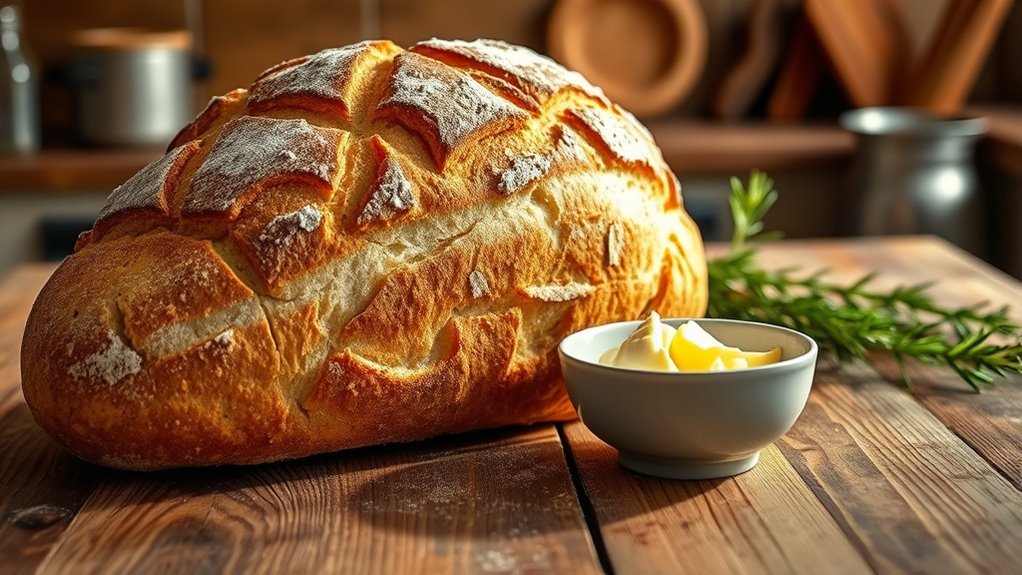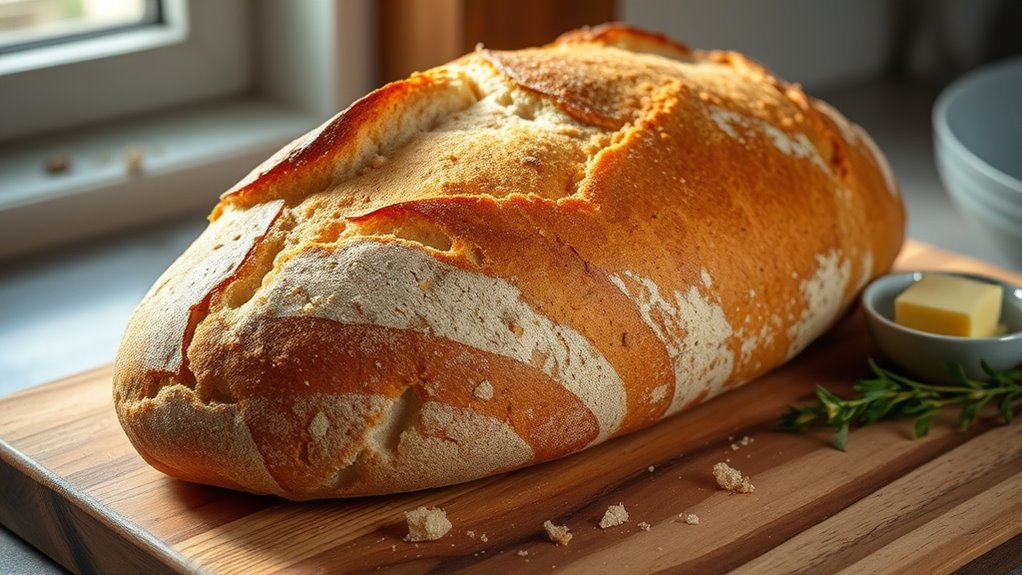Yes, you can enjoy sourdough bread on a keto diet, but portion control is essential due to its carbohydrate content, which is around 49g per 100g. Its unique fermentation process makes it more digestible and nutrient-dense compared to traditional bread. Pair smaller slices with high-fat, low-carb toppings to maintain your carb limits while savoring its flavors. If you want to explore tips and recipes for keto-friendly sourdough, there are plenty of options available.
Understanding Sourdough Bread

Understanding sourdough bread requires recognizing its unique fermentation process, which distinguishes it from other types of bread. Sourdough’s origins trace back thousands of years, with ancient civilizations utilizing wild yeast and bacteria for leavening. This natural fermentation not only enhances flavor but also contributes to its distinctive texture. You’ll find countless sourdough variations around the world, from the tangy San Francisco style to the denser German rye. Each variation reflects local ingredients and baking traditions, showcasing the bread’s adaptability. As you explore sourdough, you’ll appreciate how this age-old method of baking empowers you to create something uniquely yours, offering a sense of freedom in your culinary pursuits. Understanding these elements deepens your appreciation for this timeless staple.
Nutritional Profile of Sourdough

The nutritional profile of sourdough bread sets it apart from many conventional bread options, making it a fascinating choice for those mindful of their diet. Sourdough benefits include improved digestibility due to the fermentation process, which breaks down gluten and phytic acid. Historically, sourdough has been a staple for centuries, demonstrating its lasting appeal and nutritional value.
You’ll find that sourdough typically contains more vitamins and minerals than regular bread, thanks to the natural fermentation that enhances nutrient availability. Additionally, the probiotics present can support gut health. While it’s important to take into account your overall carbohydrate intake, understanding sourdough’s unique nutritional attributes can help you make informed decisions about including it in your diet.
Carbohydrate Content in Sourdough

While many people enjoy sourdough for its unique flavor and texture, it’s important to take into account its carbohydrate content, especially if you’re following a ketogenic diet. Here’s a quick carbohydrate comparison between sourdough and other common breads:
| Bread Type | Carbohydrates per 100g |
|---|---|
| Sourdough | 49g |
| Whole Wheat Bread | 47g |
| White Bread | 49g |
| Rye Bread | 46g |
Despite these numbers, sourdough offers some benefits, like easier digestibility due to fermentation. However, if you’re strictly limiting carbs on a keto diet, you’ll want to enjoy sourdough in moderation. Balancing your choices can help you stay on track while still appreciating its unique qualities.
The Fermentation Process and Its Benefits
Fermentation is a fascinating process that not only gives sourdough its distinctive tang but also enhances its nutritional profile. During fermentation, beneficial bacteria and yeast break down gluten and phytic acid, improving digestibility and nutrient absorption. This means you may experience fermentation benefits like better gut health and a more balanced blood sugar response. The health properties of sourdough can include increased levels of vitamins and minerals, making it a more nutritious option compared to traditional bread. Additionally, the slow fermentation process tends to lower the glycemic index, which is essential for those on a keto diet. By choosing sourdough, you’re not just enjoying a unique flavor; you’re also embracing a healthier, more nourishing food choice.
Sourdough vs. Traditional Bread
When comparing sourdough to traditional bread, it’s important to reflect on how their differences impact your health and dietary choices. Sourdough varieties often undergo a fermentation process that enhances digestibility and nutrition, while traditional baking usually relies on commercial yeast, which may not offer the same benefits. Here’s a comparison to evaluate:
| Aspect | Sourdough Bread | Traditional Bread |
|---|---|---|
| Fermentation | Natural, long-lasting | Quick, commercial yeast |
| Nutritional Value | Higher, probiotics | Lower, fewer nutrients |
| Digestibility | Easier to digest | May cause bloating |
| Flavor | Tangy, complex | Mild, uniform |
Understanding these distinctions can empower you to make choices that align with your health goals and dietary freedom. Additionally, the fermentation process in sourdough offers improved digestibility that may help those with gluten sensitivities.
Can Sourdough Fit Into a Keto Diet?
Sourdough bread’s unique fermentation process raises a common question for those following a keto diet: Can it fit into your low-carb lifestyle? While traditional sourdough contains more carbohydrates than keto-friendly options, its fermentation may lower net carbs by breaking down some starches, enhancing keto compatibility. The sourdough benefits include improved digestion and a lower glycemic index, which can help stabilize blood sugar levels. If you’re craving bread, opting for a small portion of whole grain sourdough can be a way to enjoy it without derailing your diet. Ultimately, moderation is key; keep an eye on your total carb intake. Additionally, incorporating low-glycemic carbs into your meals can further support your ketogenic goals. So, if you truly love sourdough, you might find a way to make it work within your keto journey.
Alternatives to Sourdough for Keto Followers
If you’re following a keto diet and looking for alternatives to sourdough, there are several options that can satisfy your bread cravings without compromising your carb limits. Consider using keto-friendly flours like almond flour, coconut flour, and psyllium husk to create low carb substitutes. Nut-based breads, such as those made from almond flour or flaxseed bread, are delicious and filling. You might also enjoy cauliflower bread or zucchini bread, both of which are great for making sandwiches or toasting. Seed breads are another excellent choice that provides healthy fats and fiber. These alternatives allow you to enjoy the texture and taste of bread while keeping your carbohydrate intake in check. Additionally, incorporating low-carb substitutes into your meals can help maintain your keto objectives while enjoying the flavors you love.
Tips for Enjoying Sourdough on Keto
When enjoying sourdough on a keto diet, it’s essential to choose low-carb flour to keep your carb count in check. Controlling portion sizes can also help you enjoy this tasty bread without derailing your goals. Finally, pairing sourdough with keto-friendly foods can enhance your meal while keeping it aligned with your dietary needs.
Choose Low-Carb Flour
Finding the right low-carb flour is crucial for making keto-friendly sourdough bread, as traditional wheat flour can greatly impact your carb intake. Luckily, there are several low carb options and flour substitutes that can help you enjoy sourdough without derailing your diet. Almond flour, coconut flour, and flaxseed meal are popular choices, each offering unique flavors and textures. You might also consider using a blend of these flours to achieve the desired consistency. Remember, the fermentation process in sourdough can alter the carb content slightly, but sticking to low-carb flours guarantees you maintain your keto goals. *Incorporating low-carb vegetables into your meals can further enhance your nutrition while on a keto diet.* Experimenting with different combinations can lead to delicious results that satisfy your cravings while keeping your carb count in check. Enjoy the freedom of baking!
Control Portion Sizes
While enjoying sourdough bread on a keto diet can be tempting, controlling portion sizes is essential to stay within your carb limits. Mindful eating is key here; it’s about savoring each bite while being conscious of how much you’re consuming. Instead of having a full slice, consider cutting it in half or even into smaller portions. This way, you can still enjoy the flavors without overindulging. Pair your sourdough with high-fat, low-carb toppings to enhance satisfaction. Remember, portion control doesn’t mean deprivation; it allows you the freedom to enjoy your favorite foods while maintaining your keto goals. By being mindful of your portions, you can truly enjoy sourdough without the guilt.
Pair With Keto Foods
To fully enjoy sourdough bread on a keto diet, pairing it with the right foods can enhance both flavor and nutritional balance. Consider complementing your sourdough with keto-friendly toppings like avocado, which adds healthy fats, or cream cheese for a rich texture. For a satisfying meal, try it with grilled chicken or smoked salmon. These sourdough pairings not only elevate the taste but also help keep your carb count in check. You can also create delicious keto snacks by toasting sourdough and serving it with a side of low-carb dip, such as spinach-artichoke or guacamole. By thoughtfully selecting your pairings, you can enjoy sourdough while staying aligned with your keto lifestyle.
Recipes for Keto-Friendly Sourdough
When it comes to creating keto-friendly sourdough, using alternative ingredients can make all the difference. You’ll find easy low-carb recipes that not only satisfy your bread cravings but also keep you within your carb limits. Plus, there are tips for baking success that can help you achieve that perfect sourdough texture and flavor without the carbs. Incorporating healthy fats into your recipes can enhance flavor and promote satiety, ensuring you stay on track with your keto diet.
Alternative Ingredients for Bread
If you’re looking to enjoy the tangy delight of sourdough bread while sticking to your keto diet, you’ll need to explore alternative ingredients that reduce carbohydrates without sacrificing flavor. Almond flour and coconut flour are popular low-carb choices that create a light texture. Adding psyllium husk can enhance elasticity, making your bread more bread-like. Flaxseed meal and chia seeds not only provide healthy fats but also help bind the mixture. Incorporating oat fiber boosts fiber content while keeping carbs low. For a protein punch, consider adding protein powder or essential wheat gluten. Finally, nutritional yeast can lend a cheesy flavor, enriching your keto sourdough experience. With these ingredients, you can savor your bread without guilt. Additionally, incorporating healthy fats from sources like cream cheese can further enhance flavor and keep you satisfied on your keto journey.
Easy Low-Carb Recipes
While many people think of sourdough as a high-carb indulgence, there are plenty of easy low-carb recipes that let you enjoy this beloved bread without breaking your keto commitment. Here are three delicious options to try:
- Keto Sourdough Bread: Use almond flour and psyllium husk for a fiber-rich base, adding healthy fats like olive oil for moisture.
- Sourdough Breakfast Muffins: Mix your sourdough starter with eggs, cheese, and protein sources for a quick breakfast that pairs well with easy dips or salad ideas.
- Low-Carb Sourdough Pizza: Create a crust using cauliflower and cheese, perfect for satisfying those pizza cravings while keeping your meals keto-friendly.
These recipes are not just tasty but also incorporate sugar substitutes and healthy fats, making meal prep a breeze! Additionally, these options support low-carb choices that are packed with essential nutrients while allowing you to maintain your keto lifestyle.
Tips for Baking Success
Successfully baking keto-friendly sourdough bread requires a few key techniques to achieve that signature texture and flavor without the high carbohydrate content. Start by using almond or coconut flour as your base, as these keep carbs low while providing the right consistency. You’ll want to master sourdough techniques like proper fermentation and incorporating a starter for depth of flavor. Pay attention to your baking temperature; a preheated oven at around 450°F guarantees a crispy crust while keeping the inside soft. Experiment with hydration levels to find the right balance for your dough. Finally, allow your bread to cool completely before slicing to maintain its structure and flavor. Additionally, incorporating higher fiber content into your bread can support digestive health and enhance meal satisfaction. Enjoy your baking journey towards delicious, guilt-free sourdough!
Final Thoughts on Sourdough and Keto
As you explore the relationship between sourdough bread and a ketogenic diet, it’s important to weigh both the potential benefits and drawbacks. While traditional sourdough isn’t typically low in carbs, it can offer some keto benefits if consumed in moderation. Here are a few points to keep in mind:
- Sourdough Alternatives: Look for low-carb or gluten-free sourdough options that fit better within your keto plan.
- Fermentation Benefits: The fermentation process may improve digestibility and nutrient absorption, making it a healthier choice than standard bread.
- Mindful Consumption: If you choose to indulge, be mindful of portion sizes to stay within your carb limits.
Additionally, understanding hidden carbs can help you make more informed choices about what to include in your diet.
Ultimately, you can enjoy sourdough in a keto lifestyle, but it’s essential to make informed choices that align with your goals.
Frequently Asked Questions
Is Sourdough Bread Gluten-Free?
Sourdough bread isn’t inherently gluten-free; it’s made from traditional wheat flour. However, during sourdough fermentation, some individuals find that the process partially breaks down gluten, making it easier to digest for some. If you’re seeking gluten-free options, look for breads made from gluten-free grains like rice or almond flour. Embracing these alternatives can grant you the freedom to enjoy bread while adhering to dietary needs without sacrificing flavor or texture.
How Does Sourdough Affect Blood Sugar Levels?
Sourdough can actually help regulate blood sugar levels due to its fermentation process. The probiotics and prebiotics in sourdough may improve insulin sensitivity, which can be beneficial if you’re monitoring your glucose. Plus, its lower glycemic index compared to regular bread means it might cause a slower rise in blood sugar. So, enjoying sourdough in moderation could offer some sourdough benefits while still allowing you to savor your meals freely.
Can I Make Sourdough With Almond Flour?
Yes, you can make sourdough with almond flour! Using almond flour has its benefits, like being low in carbs and high in healthy fats, which fits perfectly into a keto lifestyle. When baking, remember to adjust your hydration levels, as almond flour absorbs more moisture. You might also consider adding a binding agent like xanthan gum for better texture. Experimenting with these tips can help you enjoy delicious keto-friendly sourdough.
What Are the Best Toppings for Keto Sourdough?
Imagine a canvas, ready for your culinary masterpiece. For keto sourdough, consider topping it with rich avocado or creamy almond butter as keto spreads. Low carb toppings like smoked salmon, fresh herbs, or a sprinkle of cheese can elevate your creation. You might also enjoy a dollop of Greek yogurt with berries for a revitalizing twist. These choices not only satisfy your taste buds but also keep you aligned with your keto journey.
How Long Does Homemade Sourdough Last?
Homemade sourdough typically lasts about 4 to 5 days when stored properly. To maximize bread freshness, keep it in a paper bag at room temperature, which allows airflow and prevents moisture build-up. If you want to extend its life, consider freezing it, which can preserve sourdough for up to three months. Just slice before freezing, so you can grab a piece whenever you want, enjoying that delicious flavor without waste!
References
- https://www.ncbi.nlm.nih.gov/pmc/articles/PMC6521033/
- https://www.healthline.com/nutrition/keto-diet-foods
- https://www.medicalnewstoday.com/articles/321225
- https://www.wheathealth.org/health-benefits-sourdough-bread
- https://www.cdc.gov/healthyweight/assessing/bmi/adult_bmi/english_bmi_calculator/interactive_bmi_calculator.html
- https://www.washingtonpost.com/lifestyle/wellness/sourdough-bread-health-benefits/2020/12/09/8e38c3f0-3f88-11eb-b58b-162c2c848c7a_story.html
- https://www.bbc.com/news/health-49688773


